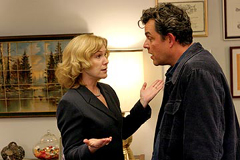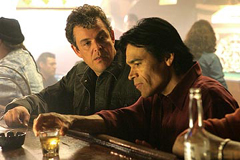|
Newest Reviews:
New Movies -
The Tunnel
V/H/S
The Tall Man
Mama Africa
Detention
Brake
Ted
Tomboy
Brownian Movement
Last Ride
[Rec]≥: Genesis
Hara-Kiri: Death of a Samurai
Indie Game: The Movie
Abraham Lincoln: Vampire Hunter
Old Movies -
Touki Bouki: The Journey of the Hyena
Drums Along the Mohawk
The Chase
The Heiress
Show
People
The Strange Affair of Uncle Harry
Pitfall
Driftwood
Miracle Mile
The Great Flamarion
Dark Habits
Archives -
Recap: 2000,
2001, 2002,
2003, 2004
, 2005, 2006,
2007 , 2008
, 2009 ,
2010 , 2011 ,
2012
All reviews alphabetically
All reviews by star rating
All reviews by release year
Masterpieces
Screening Log
Links
FAQ
E-mail me
HOME
| |
Silver City (John Sayles, 2004)
 Silver
City, the latest thinly veiled political ramble from John Sayles, gets off
to a wobbly start with the introduction of Dickie Pillager (Chris Cooper in what
might be a career-worst performance), a dunderheaded manure peddler, turned
gubernatorial candidate, and a thinly veiled stand-in for George W. Bush. It
doesnít take long to recognize that this is one of those John Sayles
movies, where everyone's either a mouthpiece for the director or a villain, and
the labyrinth plot is only an excuse to introduce more mouthpieces. Even though
itís set the week before the election of the new Governor of Colorado,
thereís scarcely a mention of Pillagerís opponent. Obviously Sayles is so
convinced that he's doing right that he's scarcely concerned with doing it well.
The direction is consistently lazy, recalling filmed TV dramas in its lack of
visual style and its simple-minded editing scheme. Though thatís nothing new
from Sayles, itís still shocking to see a movie that looks this bland, despite
the fact that Haskell Wexler shot it. The disappointing thing about Silver
City, though, is that it almost threatens to work from time to time as a
sunny, funny noir, in the style of The Long Goodbye. That's mostly thanks
to Danny Huston's performance, which is admittedly nowhere near as inspired as
Elliot Gould's in the Altman film, but still effective thanks to the actorís
inescapably false smile. Less a private investigator than a hired thug, this
lapsed Liberal takes nothing that surrounds him too seriously, which helps in a
movie so driven by a political agenda. Among the giant cast, Darryl Hannah also
stands out, for giving the film a kick in the pants when it needs it most.
Silver
City, the latest thinly veiled political ramble from John Sayles, gets off
to a wobbly start with the introduction of Dickie Pillager (Chris Cooper in what
might be a career-worst performance), a dunderheaded manure peddler, turned
gubernatorial candidate, and a thinly veiled stand-in for George W. Bush. It
doesnít take long to recognize that this is one of those John Sayles
movies, where everyone's either a mouthpiece for the director or a villain, and
the labyrinth plot is only an excuse to introduce more mouthpieces. Even though
itís set the week before the election of the new Governor of Colorado,
thereís scarcely a mention of Pillagerís opponent. Obviously Sayles is so
convinced that he's doing right that he's scarcely concerned with doing it well.
The direction is consistently lazy, recalling filmed TV dramas in its lack of
visual style and its simple-minded editing scheme. Though thatís nothing new
from Sayles, itís still shocking to see a movie that looks this bland, despite
the fact that Haskell Wexler shot it. The disappointing thing about Silver
City, though, is that it almost threatens to work from time to time as a
sunny, funny noir, in the style of The Long Goodbye. That's mostly thanks
to Danny Huston's performance, which is admittedly nowhere near as inspired as
Elliot Gould's in the Altman film, but still effective thanks to the actorís
inescapably false smile. Less a private investigator than a hired thug, this
lapsed Liberal takes nothing that surrounds him too seriously, which helps in a
movie so driven by a political agenda. Among the giant cast, Darryl Hannah also
stands out, for giving the film a kick in the pants when it needs it most.
 Unfortunately, the lackadaisical tone that Hustonís presence brings also keeps
the film from accumulating in power in the way that many of Saylesí films
manage to, despite the unevenness of their individual scenes. Itís frequently
difficult to get a grip on whether a given interaction is being taken seriously,
played for laughs, or being looked at as such a sad state of affairs that one
can only respond with laughter. If this film, like all film noir, is meant to
reflect the undiscussed values of the times that created it, then by setting his
film almost entirely in the day, Sayles is pointing out that corruption is a
universally accepted open secret in our modern political arena. Itís an
excellent starting point for a film to make, but itís scarcely developed as
the movie progresses, and isnít a very dramatically satisfying conceit. In
fact, only a few short scenes, such as one in which a visit to a construction
site demonstrates political corruption operating on a smaller scale or another
in which we see the media-castrating power of Corporate America at work, manage
to dramatize it at all. Many see Sayles as a maverick force in independent
American cinema, and forgive his weaknesses as a director as a result, but his
latest is filled with whiny, ceaselessly expository scenes (one includes a
slideshow!) that not only are badly staged, but also poorly written. To these
eyes, his most successful works (Passion
Fish, Limbo) are those that have
the least to prove to an audience that Sayles should realize is already largely
on his side.
Unfortunately, the lackadaisical tone that Hustonís presence brings also keeps
the film from accumulating in power in the way that many of Saylesí films
manage to, despite the unevenness of their individual scenes. Itís frequently
difficult to get a grip on whether a given interaction is being taken seriously,
played for laughs, or being looked at as such a sad state of affairs that one
can only respond with laughter. If this film, like all film noir, is meant to
reflect the undiscussed values of the times that created it, then by setting his
film almost entirely in the day, Sayles is pointing out that corruption is a
universally accepted open secret in our modern political arena. Itís an
excellent starting point for a film to make, but itís scarcely developed as
the movie progresses, and isnít a very dramatically satisfying conceit. In
fact, only a few short scenes, such as one in which a visit to a construction
site demonstrates political corruption operating on a smaller scale or another
in which we see the media-castrating power of Corporate America at work, manage
to dramatize it at all. Many see Sayles as a maverick force in independent
American cinema, and forgive his weaknesses as a director as a result, but his
latest is filled with whiny, ceaselessly expository scenes (one includes a
slideshow!) that not only are badly staged, but also poorly written. To these
eyes, his most successful works (Passion
Fish, Limbo) are those that have
the least to prove to an audience that Sayles should realize is already largely
on his side.
37
Jeremy Heilman
08-10-04
|